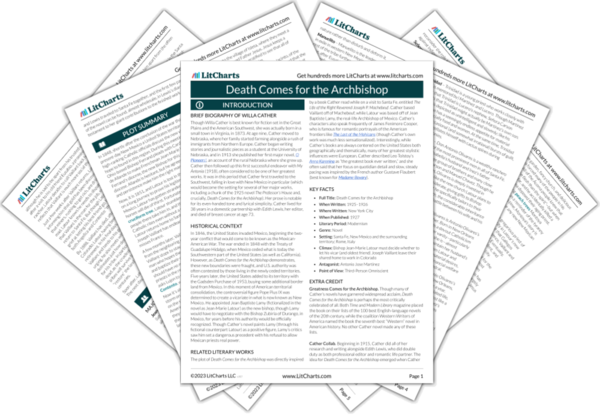Jacinto Quotes in Death Comes for the Archbishop
The Bishop seldom asked Jacinto about his thoughts or beliefs. He didn’t think it polite, and he believed it to be useless. There was no way in which he could transfer his own memories of European civilization into the Indian mind, and he was quite willing to believe that behind Jacinto there was a long tradition, a story of experience, which no language could translate to him.
Among the Indians measles, scarlatina and whooping-cough were as deadly as typhus or cholera. Certainly, the tribe was decreasing every year. Jacinto’s house was at one end of the living pueblo; behind it were long rock ridges of dead pueblo,—empty houses ruined by weather and now scarcely more than piles of earth and stone. The population of the living streets was less than a hundred adults. This was all that was left of the rich and populous Cicuyé of Coronado’s expedition. […]
As Father Latour sat by the fire and listened to the wind sweeping down from the mountains and howling over the plateau, he thought of these things; and he could not help wondering whether Jacinto, sitting silent by the same fire, was thinking of them, too.
Though the Bishop had worked with Father Joseph for twenty-five years now, he could not reconcile the contradictions of his nature. He simply accepted them, and, when Joseph had been away for a long while, realized that he loved them all. His Vicar was one of the most truly spiritual men he had ever known, though he was so passionately attached to many of the things of this world. Fond as he was of good eating and drinking, he not only rigidly observed all the facts of the church, but he never complained about the hardness and scantiness of the fare on his long missionary journeys. Father Joseph’s relish for good wine might have been a fault in another man. But […] time and again the Bishop had seen a good dinner, a bottle of claret, transformed into spiritual energy under his very eyes.

Jacinto Quotes in Death Comes for the Archbishop
The Bishop seldom asked Jacinto about his thoughts or beliefs. He didn’t think it polite, and he believed it to be useless. There was no way in which he could transfer his own memories of European civilization into the Indian mind, and he was quite willing to believe that behind Jacinto there was a long tradition, a story of experience, which no language could translate to him.
Among the Indians measles, scarlatina and whooping-cough were as deadly as typhus or cholera. Certainly, the tribe was decreasing every year. Jacinto’s house was at one end of the living pueblo; behind it were long rock ridges of dead pueblo,—empty houses ruined by weather and now scarcely more than piles of earth and stone. The population of the living streets was less than a hundred adults. This was all that was left of the rich and populous Cicuyé of Coronado’s expedition. […]
As Father Latour sat by the fire and listened to the wind sweeping down from the mountains and howling over the plateau, he thought of these things; and he could not help wondering whether Jacinto, sitting silent by the same fire, was thinking of them, too.
Though the Bishop had worked with Father Joseph for twenty-five years now, he could not reconcile the contradictions of his nature. He simply accepted them, and, when Joseph had been away for a long while, realized that he loved them all. His Vicar was one of the most truly spiritual men he had ever known, though he was so passionately attached to many of the things of this world. Fond as he was of good eating and drinking, he not only rigidly observed all the facts of the church, but he never complained about the hardness and scantiness of the fare on his long missionary journeys. Father Joseph’s relish for good wine might have been a fault in another man. But […] time and again the Bishop had seen a good dinner, a bottle of claret, transformed into spiritual energy under his very eyes.











